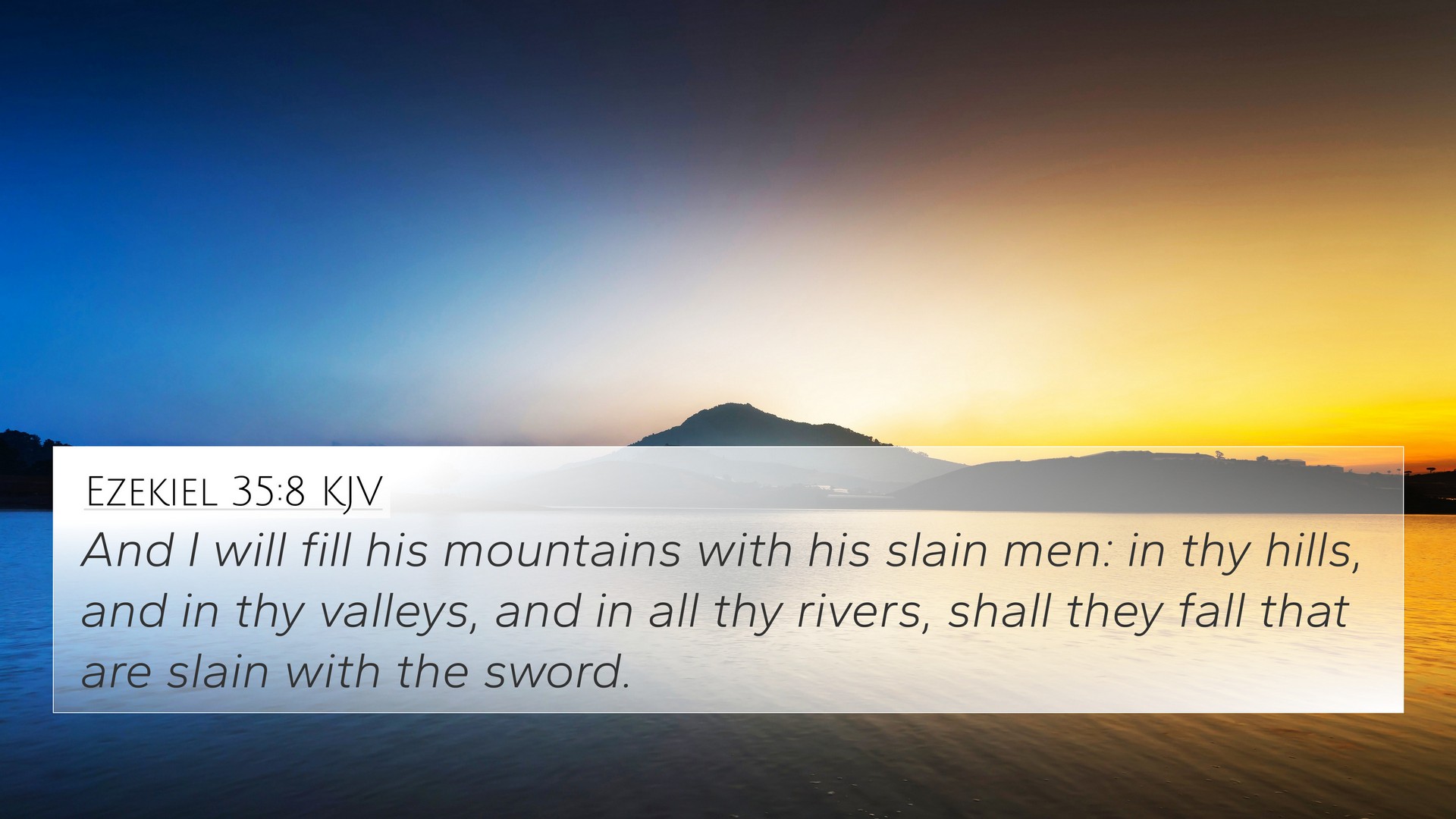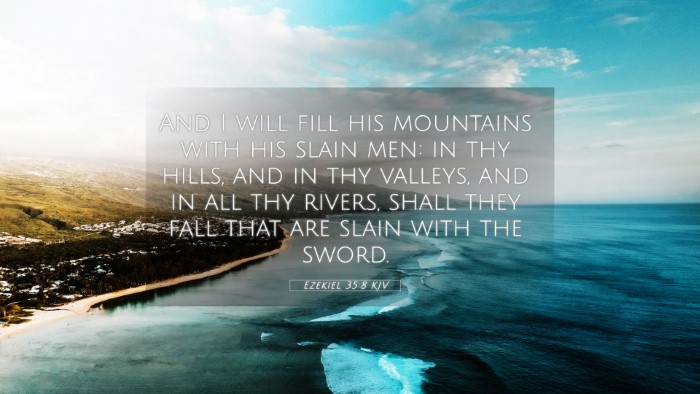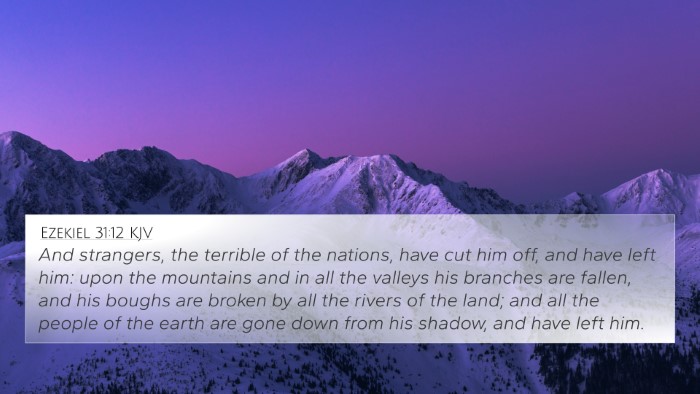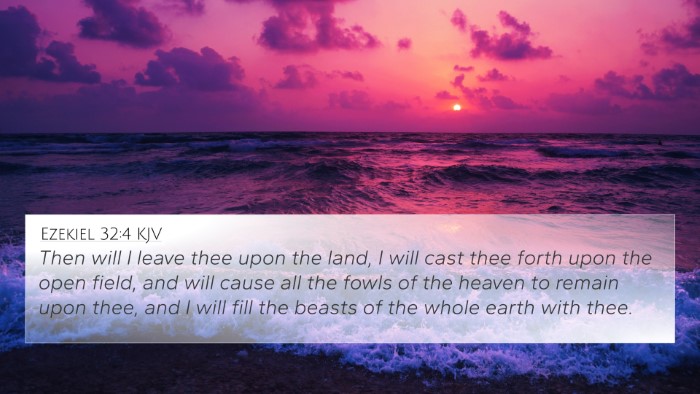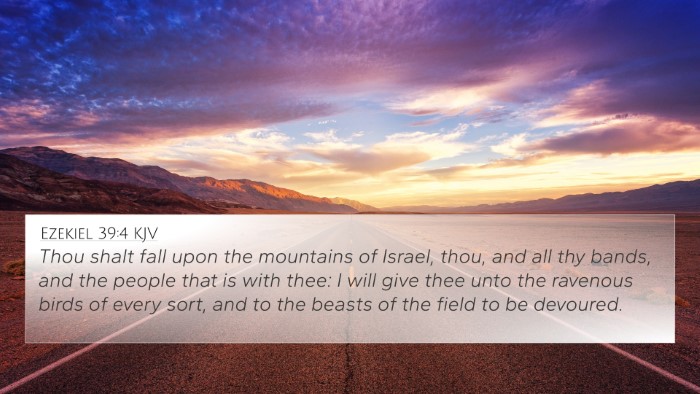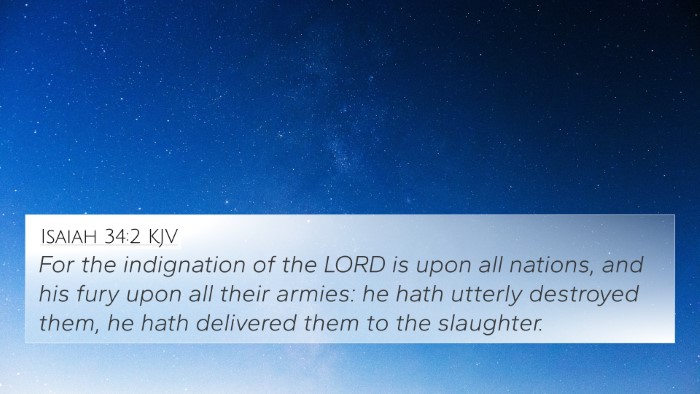Ezekiel 35:8 – Summary and Interpretation
Ezekiel 35:8 reads: "I will fill his mountains with his slain men; in thy hills, and in thy valleys, and in all thy rivers shall they fall that are slain with the sword." This verse is part of a prophetic judgment against Edom, condemning them for their actions against Israel.
Understanding the Context
This chapter addresses Edom's historic enmity towards Israel, particularly their rejoicing over Jerusalem's downfall. Ezekiel conveys God's anger and intentions to bring retribution, marking a significant moment in the prophetic declarations.
Overall Meaning of the Verse
The verse illustrates God's judgment against Edom, where the mention of "slain men" signifies destruction and divine justice. It reflects the idea that God holds nations accountable for their actions, especially regarding His chosen people.
Insights from Public Domain Commentaries
-
Matthew Henry:
Henry emphasizes that this judgment serves as a warning against pride and malice. Edom's joy in Israel's misfortunes only adds to their guilt, and this prophecy assures that their crimes will not go unpunished.
-
Albert Barnes:
Barnes notes that this passage reflects a broader theme of divine justice. He highlights God's omnipotence and the certainty of His judgments, suggesting that those who oppose God's will will face severe consequences.
-
Adam Clarke:
Clarke points out that the geographical references in the verse signify that God's judgment extends throughout the land of Edom, emphasizing that no part of their territory will escape divine retribution.
Bible Cross-References
To understand Ezekiel 35:8 more comprehensively, several cross-references can be explored:
- Obadiah 1:10-16: Highlights the violence against Jacob and the resulting judgment.
- Isaiah 34:5-6: Discusses the sword of the Lord, symbolizing devastation against Edom.
- Amos 1:11-12: Further prophecies against Edom for their unforgiving nature.
- Psalm 137:7: Expresses the longing for justice against those who have harmed Israel.
- Jeremiah 49:7-22: A prophecy focused on Edom's coming judgment due to their pride.
- Zephaniah 2:8-10: Condemnation of the enemies of God’s people, including Edom.
- Lamentations 4:21: A context of wandering and suffering related to the fall of Jerusalem.
- Malachi 1:3: Reflects on God’s continued disdain for Edom's actions against Israel.
- Romans 12:19: Paul’s teaching on vengeance, resembling God's promise of retribution.
- Revelation 18:20: God’s judgment on nations and cities that oppose Him.
Thematic Connections
This verse demonstrates themes of:
- Divine Justice: God's enforcement of justice against those who harm His people.
- The Consequences of Pride: Edom's arrogance leads to their downfall, highlighting a spiritual principle.
- Restoration and Retribution: The cycle of judgment and eventual restoration for Israel as God's chosen people.
Conclusion
In conclusion, Ezekiel 35:8 serves as a powerful reminder of God's sovereignty and justice, especially in the context of Edom's historic enmity towards Israel. It invites readers to reflect on the nature of divine judgment and the importance of aligning with God's will.
Further Study Tools
For those looking to deepen their understanding, consider using the following:
- Bible Concordance: To find related passages and themes throughout scripture.
- Cross-Reference Bible Study: A method for linking Bible verses across different contexts.
- Bibliographic Resources: Including commentaries and theological works that explore these verses in detail.
Bible Verse Parallels
Exploring parallels can enhance understanding:
- Comparing prophetic judgments in different books of the Old Testament.
- Examining how New Testament authors reference themes of judgment and redemption.
Considering the connections between verses fosters a richer comprehension of biblical themes, underlining the importance of cross-referencing biblical texts when studying scripture.
